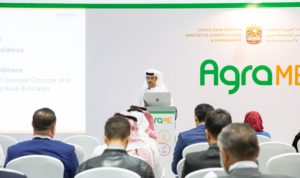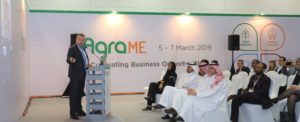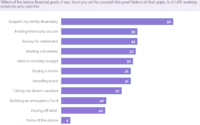AgraME Conference To Highlight Latest Trends In AgraTech, Aquaculture And Animal Farming
The UAE Ministry of Climate Change and Environment (MoCCaE), and AgraME, the regions longest running exhibition for Agriculture, have once again collaborated to deliver a holistic, CPD -accredited conference agenda looking at the latest in AgraTech, Aquaculture, Crop Farming and Animal Farming and Veterinary with a line-up of key industry speakers set to attend.
Taking place on 3-5 March at the Dubai World Trade Centre, the event will be hosting a high level, free-to-attend conference which integrates a number of the United Nation’s Sustainable Development Goals (UN SDGs) and covers key advancements and trends within the MEA Industry in AgraTech, Animal Farming and Veterinary, Crop Farming and Aquaculture.
The conference adopting the UN SDGs is designed to help enable food security in the region. This framework has helped steer the strategy of the UAE Ministry of Climate Change and Environment and the implementation of some of the goals will be discussed and brought to life at the AgraME Conference.
The opening keynote will be delivered by H.E. Sultan Abdulla Al Hebsi, Assistant Undersecretary of Regions Sector, at the UAE Ministry of Climate Change and Environment.
One of the key sessions on day one will come from Mark Tester, Professor of Plant Science at King Abdullah University of Science and Technology, Executive Director of the Food Sector at NEOM and co-Founder of Red Sea Farms. Tester’s session will look at how todays agriculture industry is unsustainable and what can be done to lead transformation in the region.
Speaking with AgraME ahead of the exhibition, Tester said; “The NEOM Food Sector will build a world class sustainable food system that is secure, safe, healthy and affordable, setting an exemplar for the world as a global leader in agri-food tech innovation especially for production in challenging environments. Also, through Red Sea Farms we are currently developing a saltwater-based agricultural system, substituting as much freshwater as possible with currently unused saline water, reducing pressure on currently unsustainably exploited freshwater resources and breaking the food-water-energy nexus.
Given water is the primary limiting factor for food production in the Middle East, and given most water used in the region is unsustainable, the ability to undertake covered agriculture with one-tenth the water consumption is a significant contribution to increase sustainability of agriculture in the Middle East.”
Tester also commented on other innovations he feels are the most promising in leading the Middle East toward a more sustainable food industry; “Agriculture currently uses three-quarters of all the water humans use and is in the top three emitters of greenhouse gases. Both of these things have to change, and we need to deploy technologies to do this. The Middle East is very good at digital technologies, and these can be developed very well in this region, for local and global benefit. There are also many engineering and biotech innovations that can contribute.”
The conference stream on day two (4 March) will be focused on the regions burgeoning Aquaculture industry. With an overarching theme of the transformation of Aquaculture in the next 30 years, the key panel of the day will look at ‘Planning for 2050: aquaculture’s role in providing regional food security, quality and safety’, hosted by Dawood Al-Yahyai, Aquaculture, Ministry of Agriculture & Fisheries, Oman; Bram Romijn, Aquaculture Specialist, Embassy of the Kingdom of the Netherlands in Riyadh and Dr. Rohana Subasinghe, President, Asia-Pacific Chapter, World Aquaculture Society.
Animal Farming, Veterinary and Crop Farming will be the focus on day three (5 March). A keynote on ‘Biosecurity in UAE farms: an update on best practices’ will be given in the morning by Dr. Roula Hassan Shaaban, Chairperson of Board of Directors, Emirates Veterinary Association, with an afternoon panel discussion covering which crops will become mainstream in Middle Eastern Agriculture by 2030, and growing role of organic farming in Middle Eastern agriculture and how this may affect crop diversity.
Under the patronage of the UAE Ministry of Climate Change and Environment, AgraME will take place from the 3 – 5 March 2020 at the Dubai World Trade Centre, Dubai, UAE. With a targeted focus on the AgraTech, Crop Farming, Aquaculture and Animal Farming and Veterinary sectors, AgraME 2020 will attract suppliers and buyers, both locally and internationally, looking to source the latest products and innovative solutions in order to create a sustainable food supply across the MEA region.
For more information on the three conference streams and detailed agenda please visit – www.agramiddleeast.com/en/Conference.html









 Email: info@cyber-gear.com
Email: info@cyber-gear.com